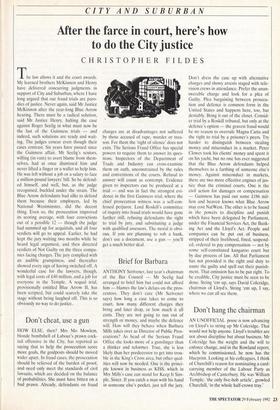Brief for Barbara
ANTHONY Scrivener, last year's chairman of the Bar Council — Mr Seelig had arranged to brief him but could not afford him — blames the law's delays on the pros- ecutors. They don't care (Mr Scrivener says) how long a case takes to come to court, how many different charges they bring and later drop, or how much it all costs. They are not going to run out of strength or money, and maybe the defence will. How will they behave when Barbara Mills takes over as Director of Public Pros- ecutions? As head of the Serious Fraud Office she looks more of a gunslinger than a thinker and reformer. True, she is less likely than her predecessor to get into trou- ble in the King's Cross area, but other qual- ities will now be needed. One is the princi- ple known in business as KISS, which in Mrs Mills's case can stand for Keep It Sim- ple, Sister. If you catch a man with his hand in someone else's pocket, just tell the jury. Don't dress the case up with alternative charges and showy arrests staged with tele- vision crews in attendance. Prefer the unan- swerable charge and look for a plea of Guilty. Plea bargaining between prosecu- tion and defence is common form in the United States and happens here, too, but deniably. Bring it out of the closet. Consid- er trial by a Roskill tribunal, but only at the defence's option — the gravest fraud would be no reason to overrule Magna Carta and the right to trial by a prisoner's peers. Try harder to distinguish between stealing money and misconduct in a market. Peter Clowes took his clients' money and spent it on his yacht, but no one has ever suggested that the Blue Arrow defendants helped themselves to a farthing of someone else's money. Against misconduct in markets, there are two more effective engines of jus- tice than the criminal courts. One is the civil action for damages or compensation — Guinness has paid out some £186 mil- lion and heaven knows what Blue Arrow may cost NatWest. The other is to be found in the powers to discipline and punish which have been delegated by Parliament, under the Financial Services Act, the Bank- ing Act and the Lloyd's Act. People and companies can be put out of business, stripped of their livelihood, fined, suspend- ed, ordered to pay compensation — not by some self-constituted kangaroo court but by due process of law. All that Parliament has not provided is the right and duty to name the guilty and spell out their punish- ment. That omission has to be put right. To be credible, City justice must be seen to be done. String 'cm up, says David Coleridge, chairman of Lloyd's. String 'em up, I say, where we can all see them.


















































 Previous page
Previous page